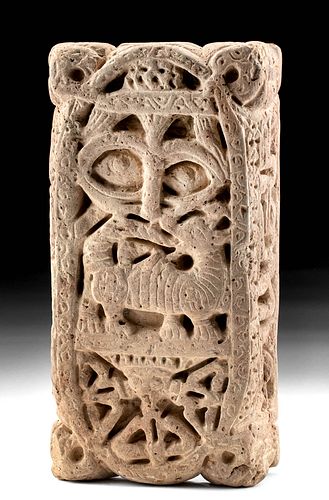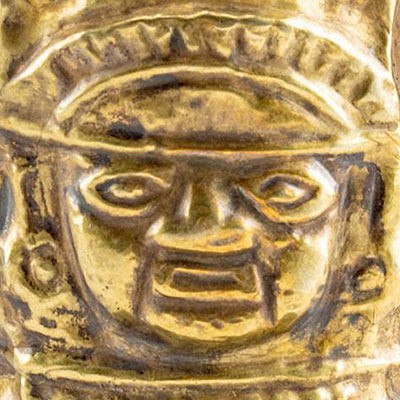Seljuk Terracotta Architectural Element with Mouflon
Lot 59d
About Seller
Artemis Fine Arts
686 S Taylor Ave, Ste 106
Louisville, CO 80027
United States
Selling antiquities, ancient and ethnographic art online since 1993, Artemis Gallery specializes in Classical Antiquities (Egyptian, Greek, Roman, Near Eastern), Asian, Pre-Columbian, African / Tribal / Oceanographic art. Our extensive inventory includes pottery, stone, metal, wood, glass and textil...Read more
Estimate:
$2,000 - $3,000
Absentee vs Live bid
Two ways to bid:
- Leave a max absentee bid and the platform will bid on your behalf up to your maximum bid during the live auction.
- Bid live during the auction and your bids will be submitted real-time to the auctioneer.
Bid Increments
| Price | Bid Increment |
|---|---|
| $0 | $25 |
| $300 | $50 |
| $1,000 | $100 |
| $2,000 | $250 |
| $5,000 | $500 |
| $10,000 | $1,000 |
| $20,000 | $2,500 |
| $50,000 | $5,000 |
| $100,000 | $10,000 |
| $200,000 | $20,000 |
About Auction
By Artemis Fine Arts
Jan 21, 2021
Set Reminder
2021-01-21 10:00:00
2021-01-21 10:00:00
America/New_York
Bidsquare
Bidsquare : Ancient / Ethnographic From Around The World
https://www.bidsquare.com/auctions/artemis-gallery/ancient-ethnographic-from-around-the-world-6316
Ancient art from Egypt, Greece, Italy and the Near East, as well as Asian, Pre-Columbian, Native American, African / Tribal / Oceanic, Spanish Colonial, Russian Icons, Fine art, much more! All categories, all price ranges... all legally acquired and guaranteed to be as described or your money back. Artemis Fine Arts info@artemisfinearts.com
Ancient art from Egypt, Greece, Italy and the Near East, as well as Asian, Pre-Columbian, Native American, African / Tribal / Oceanic, Spanish Colonial, Russian Icons, Fine art, much more! All categories, all price ranges... all legally acquired and guaranteed to be as described or your money back. Artemis Fine Arts info@artemisfinearts.com
- Lot Description
Medieval Middle East/Central Asia, Persia, modern day Turkey, Seljuk (Seljuq) Empire, ca. 11th to 12th century CE. An intricately sculpted pottery architectural element of anthropomorphic and zoomorphic form with three sides. The front features an adorable mouflon biting its tail, in a type of ouroboros design; below two large eye-like shapes and above three openwork avian-esque designs encircling a crowned visage. The entire front design is surrounded by a long ovoid border that acts as a ribbon, looping at each corner to form petaloid shapes. The border itself is decorated with wavy lines and dots. Both narrow sides are embellished with Persianized Arabic script (the official language of the Seljuk Empire). This beautiful piece was likely attached to the support column of a palace or mosque. Boasting a lovely natural hue of light terracotta, this example is an intriguing and artistically rich piece from Seljuk culture! Size: 3.375" L x 2" W x 7.75" H (8.6 cm x 5.1 cm x 19.7 cm)
The mouflon, a type of curved-horn sheep native to the Indus Valley region, is an ancient animal that is symbolic of heartiness, perseverance, and stubbornness due to its tenacious nature.
Provenance: private southern California, USA collection, acquired before 2000
All items legal to buy/sell under U.S. Statute covering cultural patrimony Code 2600, CHAPTER 14, and are guaranteed to be as described or your money back.
A Certificate of Authenticity will accompany all winning bids.
We ship worldwide and handle all shipping in-house for your convenience.
#159754Bottom and top edges have been repaired. Expected nicks/chips, stable hairline fissures, and very light fading of detail. Otherwise, excellent with lovely earthen deposits in recessed areas.Condition
- Shipping Info
-
All shipping is handled in-house for your convenience. Your invoice from Artemis Gallery will include shipping calculation instructions. If in doubt, please inquire BEFORE bidding for estimated shipping costs for individual items.
-
- Buyer's Premium



 EUR
EUR CAD
CAD AUD
AUD GBP
GBP MXN
MXN HKD
HKD CNY
CNY MYR
MYR SEK
SEK SGD
SGD CHF
CHF THB
THB















